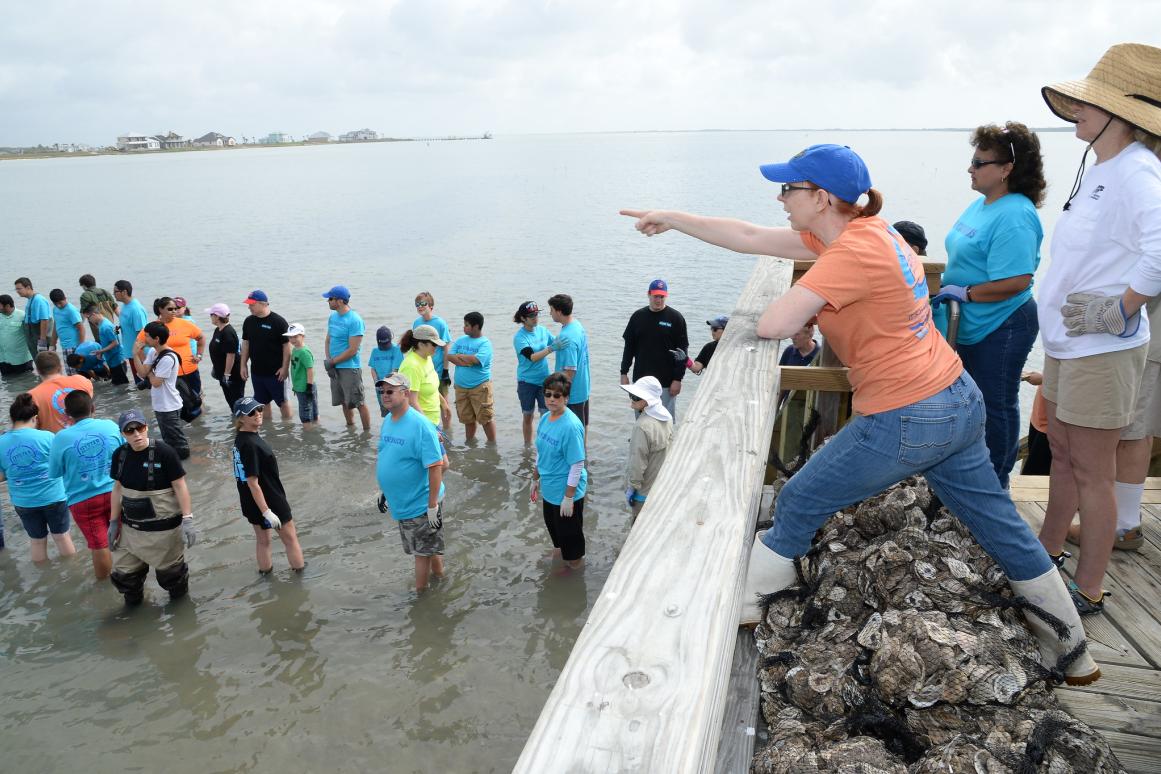HRI COO Gail Sutton Keeps the "Cycle" in Oyster Recycling Moving

Recycling can be dirty work, and no one knows that better than HRI’s Chief Operating Officer Gail Sutton.
As the organizing backbone behind the Sink Your ShucksTM Oyster Recycling Program sponsored by HRI and the College of Science and Engineering at Texas A&M University-Corpus Christi, Sutton is the person that keeps the cycle in recycle moving. She directs the pickup of donated oyster shell from local restaurants and wholesale seafood sellers; helps to organize the popular volunteer events that get the shell in the water to create new reefs; and writes grants to fund and expand the program with constantly evolving outreach ideas.
And if all else fails, Sutton will do it herself. Dr. Jennifer Pollack, associate professor for marine biology and scientific partner on the project, said that over the holidays, when oyster sales increase but most university employees are on break, Sutton has marched her family down to pick up the shells herself.
“She’s one of those people — when she knows something needs to happen, it’s going to happen. No matter what,” said Brad Lomax, owner and president of WaterStreet Restaurants and a founding partner in the Oyster Recycling Program.
The Oyster Recycling Program began in 2009 when restaurant owner Lomax was looking for a better solution for the piles of oyster shells he was paying to throw away. He teamed up with TAMUCC Mariculture Professor Dr. Joe Fox and eventually brought in Sutton, Pollack, and HRI Ecosystems and Modeling Chair Dr. Paul Montagna on board. They developed the Sink Your ShucksTM program, Texas’s first oyster recycling program to take shell from restaurants and get it back in the bay to form the bedrock for new oyster growth.

Sutton, who came to HRI after spending 19 years in the banking industry, decided to finish her master’s degree in Fisheries and Mariculture science and made it her thesis project to help build the program and to determine the value of recycling oyster shells. But in doing so she quickly realized she’d have to redefine her understanding of value.
“In the banking industry, I was always taught that profits are dollars. Here at HRI had to shift that mindset,” Sutton said. “Profits can be the people that are impacted by a project, and they can be in the environmental benefits.”
The economic viability of restoration projects is something that’s often overlooked, Pollack said.
“She has a great understanding of finance,” Pollack said. “She was able to determine that we weren’t just spinning our wheels with this project. When you look at the environmental value, taking these oyster shells and recycling them was the best use of this material.”
Oyster reefs have experienced greater losses than any other marine habitat, despite their value as fisheries habitat, their impact on improving water quality, and their role in reducing erosion and storm surge. It’s estimated that 90 percent of oyster reef habitats have been lost, compared to historic abundance, due in large part to commercial fishing. With the help of volunteers, Sink Your ShucksTM has restored about 14 acres of oyster reef in the Copano and Aransas Bay, and participants have in turn seen how that recycling directly impacts the environment. Sink Your ShucksTM has also gotten local students involved to learn more about habitat restoration, taking them out to reefs and bringing oysters into their classrooms. Last year, the program celebrated its millionth pound of oyster shell rescued from the landfill to be repurposed as productive estuary habitat.
Sutton already has her hands full. As HRI’s COO, she keeps the institute running smoothly and on budget day-to-day, keeping tabs on the more than 100 staff and students who occupy the building and HRI’s $19.9 million annual budget.
“Most everyone at HRI wears multiple hats and Gail is no exception,” said HRI Executive Director Dr. Larry McKinney. “In fact, she may have the largest collection of hats at HRI. I do not think most people — even our staff — fully appreciates that, but the institute is the better for it.”
The Oyster Recycling Program remains her passion project, combining her background in business and finance with an interest in marine biology.
“It’s my outlet,” Sutton said. “Oysters are one of the best things to recycle in the world, and the solution happens right before your eyes, which is something you don’t often get to see in science. It’s a perfect loop. We can take that oyster from a customer’s plate back to the bay, rebuilding for the next generation.”
If you'd like to volunteer to help the Sink Your ShucksTM Oyster Recycling Program build new oyster reefs, we have volunteer events coming up in April and May!
